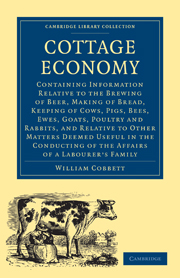Book contents
- Frontmatter
- Contents
- 1 Introduction. To the Labouring Classes of this Kingdom.—Brewing Beer
- 2 Brewing Beer continued
- 3 Making Bread
- 4 Making Bread continued.—Brewing Beer.—Keeping Cows
- 5 Keeping Cows
- 6 Keeping Pigs.—Salting Mutton and Beef
- 7 Bees, Geese, Ducks, Turkeys, Fowls, Pigeons, Rabbits, Goats and Ewes, Candles and Rushes, Mustard. Dress and Household Goods and Fuel, Hops and Yeast
- INDEX
- Frontmatter
- Contents
- 1 Introduction. To the Labouring Classes of this Kingdom.—Brewing Beer
- 2 Brewing Beer continued
- 3 Making Bread
- 4 Making Bread continued.—Brewing Beer.—Keeping Cows
- 5 Keeping Cows
- 6 Keeping Pigs.—Salting Mutton and Beef
- 7 Bees, Geese, Ducks, Turkeys, Fowls, Pigeons, Rabbits, Goats and Ewes, Candles and Rushes, Mustard. Dress and Household Goods and Fuel, Hops and Yeast
- INDEX
Summary
77. LITTLE time need be spent in dwelling on the necessity of this article to all families; though, on account of the modern custom of using potatoes to supply the place of bread, it seems necessary to say a few words here on a subject, which, in another work, I have so amply, and, I think, so triumphantly discussed. I am the more disposed to revive the subject, for a moment in this place, from having read, in the Evidence recently given before the Agricultural Committee, that many labourers, especially in the West of England, use potatoes instead of bread to a very great extent. And I find, from the same evidence, that it is the custom to allot to labourers “a potatoe ground” in part-payment of their wages! This has a tendency to bring English labourers down to the state of the Irish, whose mode of living, as to food, is but one remove from that of the pig, and of the ill-fed pig too.
78. I was, in reading the above-mentioned Evidence, glad to find, that Mr. Edward Wakefield, the best informed and most candid of all the witnesses, gave it as his opinion, that the increase which had taken place in the cultivation of potatoes was “injurious to the country;” an opinion, which must, I think, be adopted by every one who takes the trouble to reflect a little upon the subject.
- Type
- Chapter
- Information
- Cottage Economy , pp. 49 - 72Publisher: Cambridge University PressPrint publication year: 2009First published in: 1822

